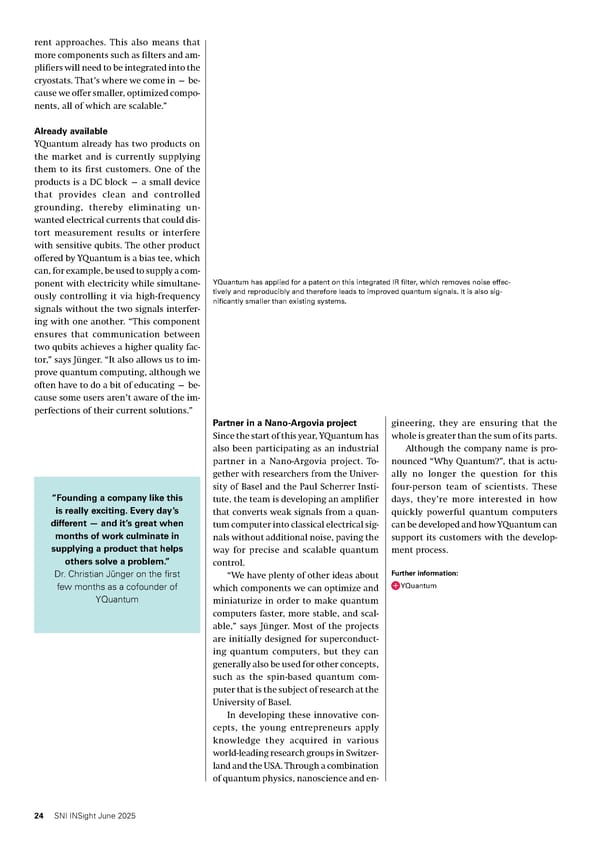“Founding a company like this is really exciting. Every day’s different — and it’s great when months of work culminate in supplying a product that helps others solve a problem.” Dr. Christian Jünger on the first few months as a cofounder of YQuantum rent approaches. This also means that more components such as filters and am- plifiers will need to be integrated into the cryostats. That’s where we come in — be- cause we offer smaller, optimized compo- nents, all of which are scalable.” Already available YQuantum already has two products on the market and is currently supplying them to its first customers. One of the products is a DC block — a small device that provides clean and controlled grounding, thereby eliminating un- wanted electrical currents that could dis- tort measurement results or interfere with sensitive qubits. The other product offered by YQuantum is a bias tee, which can, for example, be used to supply a com- ponent with electricity while simultane- ously controlling it via high-frequency signals without the two signals interfer- ing with one another. “This component ensures that communication between two qubits achieves a higher quality fac- tor,” says Jünger. “It also allows us to im- prove quantum computing, although we often have to do a bit of educating — be- cause some users aren’t aware of the im- perfections of their current solutions.” YQuantum has applied for a patent on this integrated IR filter, which removes noise effec- tively and reproducibly and therefore leads to improved quantum signals. It is also sig- nificantly smaller than existing systems. Partner in a Nano-Argovia project Since the start of this year, YQuantum has also been participating as an industrial partner in a Nano-Argovia project. To- gether with researchers from the Univer- sity of Basel and the Paul Scherrer Insti- tute, the team is developing an amplifier that converts weak signals from a quan- tum computer into classical electrical sig- nals without additional noise, paving the way for precise and scalable quantum control. “We have plenty of other ideas about which components we can optimize and miniaturize in order to make quantum computers faster, more stable, and scal- able,” says Jünger. Most of the projects are initially designed for superconduct- ing quantum computers, but they can generally also be used for other concepts, such as the spin-based quantum com- puter that is the subject of research at the University of Basel. In developing these innovative con- cepts, the young entrepreneurs apply knowledge they acquired in various world-leading research groups in Switzer- land and the USA. Through a combination of quantum physics, nanoscience and en- gineering, they are ensuring that the whole is greater than the sum of its parts. Although the company name is pro- nounced “Why Quantum?”, that is actu- ally no longer the question for this four-person team of scientists. These days, they’re more interested in how quickly powerful quantum computers can be developed and how YQuantum can support its customers with the develop- ment process. Further information: YQuantum 24 SNI INSight June 2025
 SNI Insight - 2025 June Page 23 Page 25
SNI Insight - 2025 June Page 23 Page 25